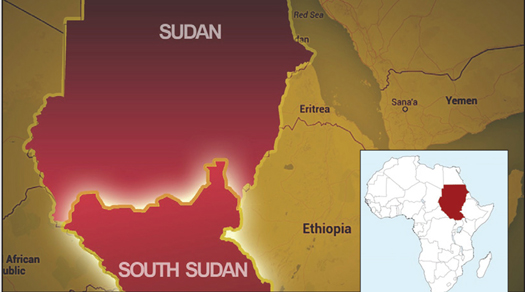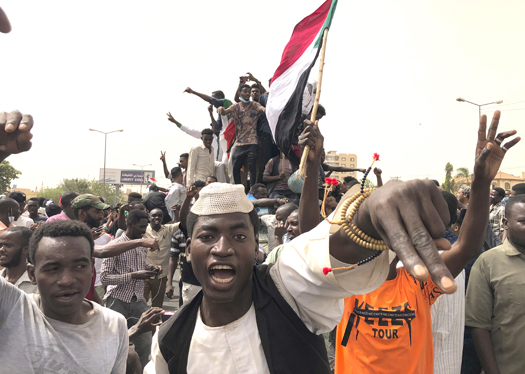Tens of thousands demonstrate across Sudan as part of continuing demand for change and greater freedom
By Jehron Muhammad | Last updated: Jul 9, 2019 - 12:54:42 PMWhat's your opinion on this article?

|
The world watched with much fear and trepidation as members of Sudan’s opposition announced a planned June 30 “Millions March.”
During a June 3 massacre of protestors outside of the Sudanese military command, over 117 were reported dead, hundreds wounded and rapes were reported by the government’s Rapid Support Force (RSF).
There was concern a major march would result in more violence as the Sudanese people demanded reforms, more power and greater democracy.
If the march even happened, an ugly conflict seemed inevitable.
But the march happened anyway. “In cities across the country tens of thousands took to the streets demanding the end of military government,” wrote BBC Africa editor Fergal Keane, in a commentary titled, “Sudan Crisis: New sense of hope for young revolutionaries.”
Much of the U.S. press gave limited coverage to the Sudanese march, with the popular PBS News Hour reporting that “hundreds,” not tens of thousands, took to the streets. Most of the U.S. press led with a Hong Kong protest against the government in mainland China and the conflict between the Trump administration and Iran. Several European publications referred to protest as the “Million Man March” but offered limited coverage.

But a Los Angeles editorial called the march, “The persistence of resistance in Sudan.”
The Times editorial board said, “This is an unfortunate time for people struggling for freedom to seek help among the world’s democracies. Britain is preoccupied with Brexit. Europe is struggling with a refugee crisis and a resulting rise of right-wing nationalism, and the United States is led by a president whose principle of international relations is ‘America first.’
“But walking away from Sudan would be a mistake of moral, economic and political dimensions. Free nations must nurture self-rule among people who aspire to it or risk losing a worldwide contest between liberty and authoritarian rule.”
BBC editor Keane wrote that after the “brutal” June 3 “crackdown,” many “retreated to their homes and safe houses. But somehow (even with the internet being disabled) they kept up contact with each other and the world beyond Sudan.”
“Certainly there was fear and shock. The killing of more than 100 people, along with credible accounts of rape, had a deeply traumatizing effect,” he observed.
“Dying for the revolution,” a nine minute video produced by Mohamad Hashim, a Sudanese national who reports for the BBC, documented events leading up to the June 30 Millions March. This included interviewing his 23-year-old activist cousin “Mo,” who experienced an attempt on his life and the June 3 massacre. Mr. Hashim does not give Mo’s last name to protect his identity.
The video begins with marchers shouting in Arabic they “are ready to die,” and the revolution will live on.
When Mr. Hashim arrives at Mo’s home, they embrace and the cousin says in English he “is very traumatized.”
Mr. Hashim says to the camera, “My cousin and his generation has shouldered the burden of this revolution.”
In the video you see Mo speaking to friends as they drive up in cars and greet each other holding up two fingers, like a “V,” which he says means victory. “We have to work on it … I hope it will be ours, eventually.” He adds, “Yea we’re still scared and traumatized, whatever. We’ll be fine.”
Buoyed by the major march’s success—though 11 people were reported killed and nearly 200 wounded—protest leaders announced plans for a July 13 mass protest across the country. The day after that protest would be a day nationwide civil disobedience, reported Timesnownews.org.
On July 2, African Union and Ethiopian mediators invited Sudan’s ruling generals from the Transitional Military Council and protest leaders to resume talks. The purpose of the talks is to create a “new governing body for the country” composed of the military and a civilian coalition, according to Timesnownews.org.
The invitation was extended by African Union envoy Mohamed El Hacen Lebatt at a joint press conference that included his Ethiopian counterpart Mahmoud Dirir.
Sudan’s Transitional Military Council and the Forces for the Declaration of Freedom and Change reached a power sharing agreement July 5. Sudan’s new sovereign council for the first 21months will be led by the military, with a civilian taking over for the remaining 18 months. Many questions remain including, who will oversee the investigation into the June 3 massacre, will the agreement fulfill the democratic promises of the uprising, and why was leadership in the agreement retained by the military?
In addition, why a continued internet blackout, allowing the military state to control the narrative, making it hard to gauge the country’s reaction to the agreement?
If there is any success in creating a stable Sudan, beginning with the creation of a transitional civilian government, according to a United Nations report, General Mohamed Hamdan, also known as Hemeti, and his Rapid Support Force (RSF) has to be put in check.
According to ReliefWeb, a leading humanitarian information source on global crises and disasters for the UN office for the Coordination of Humanitarian Affairs: “The RSF’s history of brutality and impunity in Darfur, as well as current reports of infighting between the RSF and other members of the security sector, suggests that the increase in the group’s activities will drive instability in Sudan.”
General Hamdan, whose ambitions some say are at the center of events now in Sudan, is the product of a regional order which has prevailed since the beginning of the “Arab Spring” in 2011. The Middle East’s Gulf monarchies have been entrenched in a vicious conflict with Iran for regional dominion, wrote Ahmed Aboudouh, who specializes in Middle East affairs for The Independent. Having Sudan as an ally is an important part of the Gulf states’ strategy.
“Hemeti is the ultimate threat to the revolution and to any hopes for a democratic transformation in Sudan. He walks a thin line between different versions of himself. For the Gulf (Saudi Arabia and the UAE) patrons, who pledged $3 billion in April to prop up the new military regime (after he helped overthrow President Bashir), he is the guarantor of a sensitive and delicately maintained equilibrium between ideologies, battle-hardened militias and ethnic diversity,” argued writer Aboudouh.
If the world community, including the UK, the U.S. and Norway, continue to just give lip service and doesn’t, along with the UN and the European Union, pressure the Gulf states to defang Hemeti and his RSF, a replication of Abdel Fatah al-Sisi’s police state in Egypt may be inevitable.
INSIDE STORIES AND REVIEWS
-
-
About Harriett ... and the Negro Hollywood Road Show
By Rabiah Muhammad, Guest Columnist » Full Story -
Skepticism greets Jay-Z, NFL talk of inspiring change
By Bryan 18X Crawford and Richard B. Muhammad The Final Call Newspaper @TheFinalCall » Full Story -
The painful problem of Black girls and suicide
By Charlene Muhammad -National Correspondent- » Full Story -
Exploitation of Innocence - Report: Perceptions, policies hurting Black girls
By Charlene Muhammad -National Correspondent- » Full Story -
Big Ballin: Big ideas fuel a father’s Big Baller Brand and brash business sense
By Bryan Crawford -Contributing Writer- » Full Story






 Click Here Stay Connected!
Click Here Stay Connected!








